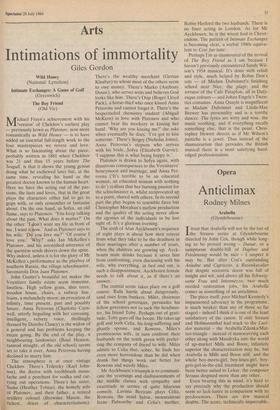Arts
Intimations of immortality
Giles Gordon
Wild Honey
(National: Lyttelton) Intimate Exchanges: A Game of Golf (Greenwich)
Michael Frayn's achievement with his `version' of Chekhov's earliest play — previously kown as Platonov, now more romantically as Wild Honey — is to have added an essential full-length work to the four masterpieces we revere and love. What is so fascinating about the piece, probably written in 1881 when Chekhov was 21 and thus 15 years before The Seagull, is that it shows the young genius doing what he eschewed later but, at the same time, revealing his hand as the greatest doctor known to the human heart. Here we have the acting out of the pas- sions, the lusts and loves, that in the great plays the characters either fail to get to grips with, or only remember or fantasise about. On the one hand, as Sofya, an old flame, says to Platonov: 'You keep talking about the past. What does it matter?' On the other: 'I don't want my life in front of rne, I want it now.' And as Platonov says to his wife: 'Do you love me?' Of course I love you.' Why?' asks Ian McKellen's Platonov, and his astonished utterance of the question sends shivers down the spine. Why indeed, unless it is for the glory of Mr McKellen's performance as the playboy of southern Russia, the village schoolmaster, Savonarola Don Juan Platonov.
John Gunter's beautiful set makes the Voynitzev family estate seem immense, limitless. High yellow grass, thin trees, wooden house, chairs, a railway line, trains, a melancholy moon: an evocation of infinity, time present, past and possibly future. Anna Petrovna (Charlotte Corn- well, utterly beguiling with her caressing, intelligent, velvety voice, thrillingly dressed by Deirdre Clancy) is the widow of a general and has problems keeping the estate going. By the end of the play, a neighbouring landowner (Basil Henson, ramrod straight, of the old school) seems set to take it over, Anna Petrovna having declined to marry him.
The atmosphere is at once vintage Chekhov. There's Triletzky (Karl John- son), the doctor with toothbrush mous- tache and a penchant for vodka and car- rying out operations. There's his sister, Sasha (Heather Tobias), the homely wife of Platonov, and their father, a retired artillery colonel (Brewster Mason, the richest, driest of characterisations). There's the wealthy merchant (Gertan Klauber) to whom most of the others seem to owe money. There's Marko (Anthony Douse), who serves writs and believes God looks like him. There's Osip (Roger Lloyd Pack), a horse-thief who once kissed Anna Petrovna and cannot forget it. There's the bespectacled chemistry student (Abigail McKern) in love with Platonov and who cannot bear his mockery in kissing her hand. 'Why are you kissing me?' she asks when eventually he does. 'I've got to kiss someone.' There's Sergey (Nicholas Jones), Anna Petrovna's stepson who arrives with his bride, Sofya (Elizabeth Garvie): 'I suppose this is what being happy is.'
Platonov is drawn to Sofya again, with disastrous consequences to the Voynitzevs' honeymoon and marriage; and Anna Pet- rovna (It's terrible to be an educated woman, an educated woman with nothing to do') realises that her burning passion for the schoolmaster is, whilst reciprocated up to a point, shared with others. In its second part the play begins to resemble farce but Christopher Morahan's mellow production and the quality of the acting never allow the agonies of the individuals to be lost sight of. It's a glorious evening.
The sixth of Alan Ayckbourn's sequence of eight plays is about how men retreat from what they take to be the deadness in their marriages after a number of years, when the children are growing up. Ayck- bourn male drinks because it saves him from confronting, even discussing with his wife, why everything, in bed and out, is such a disappointment. Ayckbourn female needs to talk about it, as if there's an answer.
The, central scene takes place on a golf course. Balls hurtle about dangerously, sand rises from bunkers. Miles, chairman of the school governors, persuades his fellow governors not to sack the headmas- ter, his friend Toby. Perhaps out of grati- tude, Toby goes off the booze. He takes up golf and both Celia, his long-suffering and ghastly spouse, and Rowena, Miles's promiscuous wife, in turn confront their husbands on the tenth green with prefer- ring the company of friend to wife. Miles admits to Celia that, sober, he finds her even more horrendous than he did when drunk but things work out better for Rowena and weedy Miles.
Mr Ayckbourn's triumph is to communi- cate the yearnings and disillusionments of the middle classes with sympathy and exactitude in scenes of quite hilarious comedy. Lavinia Bertram plays Celia, Rowena, the maid Sylvie, mountainous Irene Pidworthy and Celia's mother,
Robin Herford the two husbands. There is no finer acting in London. As for Mr Ayckbourn, he is the wisest fool in Christ- endom. The pattern of Intimate Exchanges is becoming clear, a .verbal 1980s equiva- lent to Cosi fan tutte.
Perhaps I'm as enamoured of the revival of The Boy Friend as I am because I haven't previously encountered Sandy Wil- son's 1954 musical. It's done with relish and style, much helped by Robin Don's sets — of Madam Dubonnet's finishing school near Nice; the plage; and the terrasse of the Cafe Pataplon, all in Dufy- esque colours — and Johan Engels's Twen- ties costumes. Anna Quayle is magnificent as Madam Dubonnet and Linda-Mae Brewer has personality and is a terrific dancer. The lyrics are witty and wise, the music soothing, and if everything recalls something else, that is the point. Chris- topher Hewett directs as if Mr Wilson's pastiche is a jewel. Thus instead of the shamateurism that pervades the British musical there is a most satisfying hard- edged professionalism.










































 Previous page
Previous page